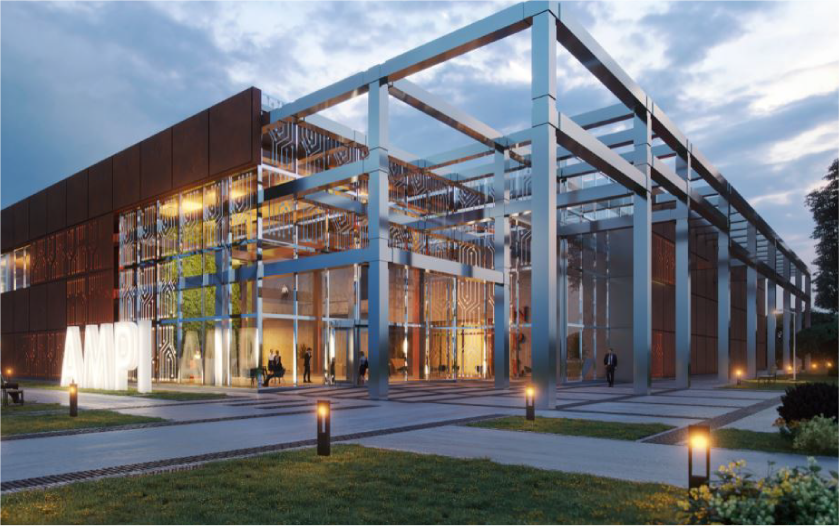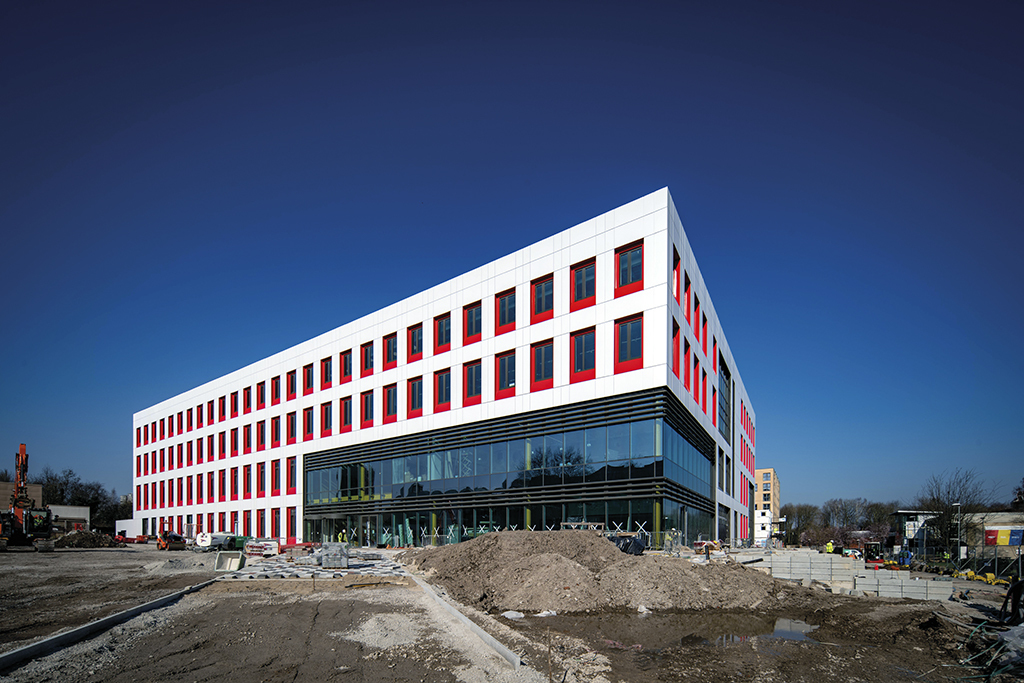The projects transforming Greater Manchester into an Advanced Manufacturing Powerhouse
As Greater Manchester prepares to attend UKREiiF 2024, we're looking at some of the key projects making the region a hub for advanced manufacturing and powering Industry 4.0.
As a city-region that spearheaded the industrial revolution, manufacturing is in Greater Manchester’s DNA. In the early 19th Century, the city’s cotton industry grew massively thanks to the creation of new technologies and the first modern railway, giving it the nickname of the First Industrial City. But that’s not all, Manchester is also where Ford made their first cars in Europe and the birthplace of the first modern computer.
Across the region, heritage buildings display its industrial past and a vast amount of manufacturing businesses are still based in the region including Siemens, AECOM, BAE Systems, Heinz, Hitachi, and Unilever.
More recently, Greater Manchester has been critical in pioneering advances in advanced materials and manufacturing. Since wonder material graphene was first isolated at The University of Manchester, the region has become a leader in advanced materials and manufacturing research, with £500m invested in GM research centres. Manchester is home to Europe’s largest school of materials and a global hub for the commercialisation of new technologies.
Now, Greater Manchester is at the heart of the UK’s largest advanced manufacturing, materials and engineering cluster with over 8,000 advanced manufacturing companies and 114,000 employees working in the sector.
Looking to the future, Greater Manchester is ready to continue its legacy as a manufacturing powerhouse by trading on its past expertise and innovative nature.
The UK Government has recently recognised the significance of Greater Manchester’s Advanced Manufacturing powers in defining the future of the UK. It was recently announced as a key location for the Government’s £100m Innovation Accelerator blueprint for the UK and as one of six UK Investment Zones to drive growth and innovation, with a specific focus on the advanced manufacturing and materials sector.
Across the region, there are districts and new investment opportunities ready to support the future of advanced manufacturing. Combined, these assets have the potential to create a burgeoning innovation ecosystem that is home to businesses, academics and innovators. By encouraging collaborations and fostering relations, these sites can establish Greater Manchester as the frontrunner in advanced materials and manufacturing.
Oxford Road Corridor

Also known as Manchester’s Innovation District, The Oxford Road Corridor is home to two of the region’s leading universities, a vast array of startup businesses and academic talent on the edge of the city centre. As the birthplace of graphene, the site is a world leader in advanced materials and has become a centre of the international commercialisation of advanced materials and manufacturing methods linked to Industry 4.0.
The Corridor is home to The National Graphene Institute and The Graphene Engineering Innovation Centre which facilitate world-leading research and industry-led development of graphene applications, helping to bring products to market.
It’s also home to the Henry
Royce Institute, the UK’s national centre for advanced materials
research and innovation. The Henry Royce Institute is part of a growing
network of facilities and provides a collaborative research environment in
advanced materials. PrintCity, a 3D additive and digital
manufacturing centre is also based on The Oxford Road
Corridor which collaborates with Greater Manchester’s businesses to
modernise manufacturing processes and increase productivity.
Atom Valley

Atom Valley, a location strategically positioned along the M62 corridor spanning Rochdale, Oldham and Bury, aims to become a mega-cluster for innovation. The Greater Manchester Mayoral Development Zone has a focus on advanced manufacturing, materials and machinery, encouraging innovation and growth in this space. This 17m sq ft site aims to supercharge the region’s economy and attract world-class businesses as well as supporting local innovators and startups. With the potential to create 20,000 quality jobs in the sector and build new 7,00 homes, Atom Valley will provide life-changing opportunities for Greater Manchester’s residents through its dedication to science and innovation.
The site has already welcomed The Centre of Expertise in Advanced Materials and Sustainability (CEAMS) and Advanced Machinery and Productivity Institute (AMPI).
AMPI will stimulate and support the rapid growth of the UK’s machinery manufacturing sector as it transitions to highly integrated digital solutions with sophisticated automated and autonomous robotic systems. Embedded metrology will produce data to monitor and control systems with well-defined levels of accuracy and precision and will provide a high degree of confidence in these systems.
CEAMs is funded as part of the Department for Science, Innovation and Technology’s (DSIT) Innovation Accelerator programme in a two-year pilot. CEAMS is led by a consortium of partners including the Rochdale Development Agency (RDA), the University of Manchester (UoM) Henry Royce Institute, the National Physical Laboratory (NPL), and the High Value Manufacturing (HVM) Catapult. These partners are working together to ensure that businesses can build on their existing capabilities to support the development of advanced, sustainable materials. The aim is to create a strong support network for these businesses that will help to anchor their operations to Greater Manchester.
MIX MANCHESTER

MIX MANCHESTER is the UK’s best-connected science, innovation and manufacturing campus which features 2m sq ft of advanced manufacturing, R&D, laboratory and office space. As Manchester’s manufacturing and innovation exchange, MIX MANCHESTER aims to enable a world-class ecosystem of complementary uses and foster collaborations.
Strategically located next to Manchester Airport, MIX MANCHESTER benefits from easy access to a highly skilled talent pool, unrivalled connectivity, proximity to the Oxford Road Corridor and global logistics connections through Manchester Airport. In fact, it is the UK’s only major science, innovation and manufacturing campus adjacent to an international airport, offering businesses and innovators unique opportunities for growth and internationalisation.
MIX MANCHESTER is being developed by a joint venture partnership between Columbia Threadneedle Investments, MAG, Beijing Construction Engineering Group International and Greater Manhester Pension Fund. It will create a sustainable innovation district which offers a great work-life balance, placing the environment and employee wellbeing at its core.
Driven by the needs of science and innovation occupiers, MIX MANCHESTER offers a flexible range of building types which can be built to suit the needs of end-users. Buildings at MIX MANCHESTER can support all kinds of advanced manufacturing businesses: from early stages or small batch manufacturing, to medium-scale manufacturing including MGP, advanced therapies and R&D, or even large-scale manufacturing including GMP and complex industries, such as advanced therapeutics.
Offering world-class R&D labs with bespoke design-and-build opportunities, MIX MANCHESTER can provide a hub of research-intensive organisations that support each other to develop new ideas and grow. A range of Grade A, new-build offices will offer options for shared and single-tenant workspaces or could be used for education and academic institutions hoping to locate close to world-leading advanced manufacturing.
Crescent Salford

Innovation plays a crucial role in an overarching goal to transform Salford Crescent, at the heart of the city and close to central Manchester, into a hotspot for learning and new ideas. The University of Salford has a long-standing relationship with the manufacturing sector, and its new facilities aim to support companies with research and development in this space to become more innovative and productive.
The North of England Robotics Innovation Centre (NERIC) is a focal point of the University of Salford’s commitment to industry collaboration, innovation, and skills. The £16m Centre opened in 2022 and hopes to become a hub for SMEs looking to develop and apply robotics and automation alongside other innovative digital technologies in their business. Its key focus areas cover robotics for intelligent infrastructure, digital automation and supply chain improvement. Offering specialist equipment and innovation support, the centre will be vital to supporting the automation of advanced materials and manufacturing businesses across the region.
The University of Salford is also supporting net-zero manufacturing through the state-of-the-art Energy House Laboratories. Originally Energy House 1 was designed to ensure the UK’s housing stock could become more energy efficient, with a research and testing laboratory including an early 20th century two-bedroom house to support the accurate and rapid assessment of retrofit technologies. Energy House 2.0 has now opened with two environmental chambers that can accommodate two detached houses under controlled conditions. The facilities can replicate a variety of weather conditions including rain, wind, snow and solar radiation with temperatures ranging from -20 to +40 degrees Celsius. Energy House Laboratories at The University of Salford hope to play a huge role in accelerating progress towards low carbon and net zero housing design, supporting the development of sustainable, advanced materials.
Greater Manchester is quickly becoming a hub for advanced materials and manufacturing, with world-class assets across the region. With support from MIDAS, Manchester's Investment Agency, global businesses are now flocking to the region to make the most of its talent, innovation assets and collaborative ecosystem.
-------------------------------------------------------------------------
To learn more about the region's strengths in this space, visit the MIDAS website, or find representatives from MIDAS, Atom Valley, MIX Manchester and our region's local authorities at The Manchester Stand, The Canary at UKREiiF.
View the Manchester Programme for UKREiiF 2024, here.